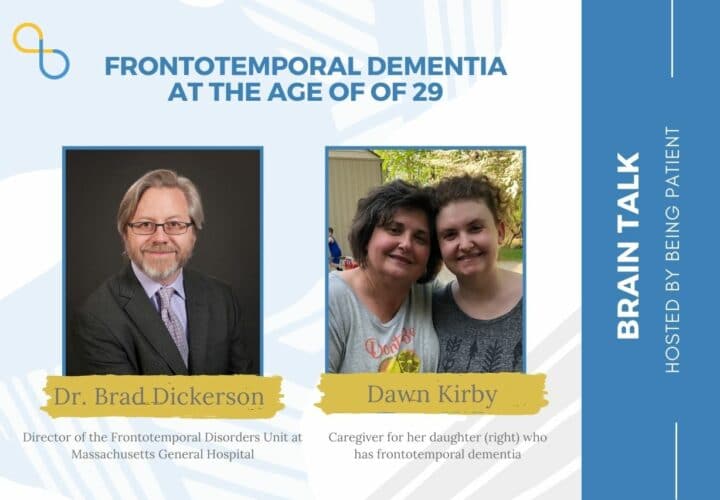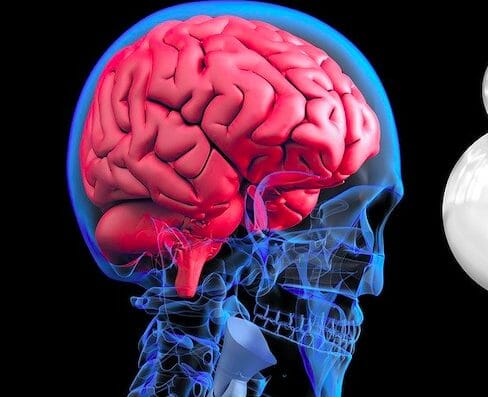Dawn Kirby and Dr. Brad Dickerson talk about caring for a loved one with frontotemporal dementia.
After the deaths of close family members and giving birth to her child, Kara Kirby began experiencing changes in her behavior and personality. Clinicians suspected that she had postpartum psychosis, and it wasn’t until roughly a year and a half later that she received a diagnosis of frontotemporal dementia at the age of 29. Being Patient sat down with her mother Dawn Kirby and Dr. Brad Dickerson, director of the Frontotemporal Disorders Unit at Massachusetts General Hospital, to speak about the diagnosis, treatment and care of people living with the condition.
- Dawn Kirby’s daughter, a former nurse, first experienced symptoms ranging from apathy and anxiety to depression and obsessive compulsive disorder (OCD).
- Frontotemporal dementia (FTD) is a rare brain disorder that affects less than 200,000 people in the United States.
- In frontotemporal dementia, nerve damages in the frontal lobes of the brain can lead to the lack of insight, as well as behavioral and personality changes.
Being Patient: Dawn, when did your family begin noticing Kara’s symptoms of FTD?
Dawn Kirby: My daughter Kara was a nurse. She was married. She was going through infertility treatments because she was wanting desperately to have a baby. In 2017, she was due to have a baby in July. We lost my 16 year old niece in a car accident six weeks before she had the baby. She had the baby, and three days later, her grandfather died.
Kara started having some withdrawals, seeming depressed, becoming anxious and OCD. First, we thought it was because the [recent events were] very traumatic, and also being a new mom, you have a tendency to be a little bit overzealous when it comes to germs and things like that.
About four months in, Kara started telling me she had this devil voice, and this voice would cuss at her and tell her everyone was dying. Of course, I decided that we needed to see a doctor and we were sent to a psychiatrist. Multiple medications were used. We just continued to see her decline. For OCD, she was washing her hands till they bled. She was very repetitive: watching the same movie and eating the same food. She was very blunt in her emotions.
By the summer of 2018, she was admitted to the perinatal psychiatric unit in UNC Chapel Hill. They readjusted her medication and approached her as a postpartum psychosis type of patient. After two and a half months, she was still not diagnosed. We were sent home after a few sessions of electroconvulsive therapy, lumbar puncture, lots of different testing. They treated her exceptionally well and they were very upset that they just couldn’t seem to figure her out.
Then her doctor decided we needed to go to Mayo Clinic, and it was actually for a psychiatric evaluation. The psychiatrist there saw her. She wanted a complete neurological workup of their own and started running multiple tests. Then, we were sent to Dr. Beove, who is our hero. He has just been amazing. It took from the middle of 2017 to February of 2019 to get her diagnosed.
Being Patient: Dr. Dickerson, we often hear similar stories like Dawn where it’s difficult for people to receive a timely and accurate diagnosis of FTD, why is that?
Dr. Brad Dickerson: FTD is a rare disease. We don’t really know what the numbers are. If we think about the most common cause of dementia — Alzheimer’s disease — that’s estimated to affect five million Americans. If we think about Parkinson’s disease for example, that’s estimated to affect a million Americans. FTD probably doesn’t even affect 200,000 people in the U.S., which is the number that the FDA typically uses to designate a disease as a rare disease. It may even be as few as 50,000.
When you’re dealing with a rare disease, it just takes medical professionals longer to recognize it, especially when you’re talking about someone so young. Most medical practitioners have never been taught that someone in that age range might be developing a neurodegenerative brain disease like frontotemporal degeneration or Alzheimer’s or Huntington’s disease.
Being Patient: What questions should doctors be asking when diagnosing someone with FTD, and what questions should caregivers ask their doctors to aid with their diagnosis?
Dr. Brad Dickerson: The place to start is to say, “Is this person losing function? Is this person beginning to not do the things that they used to be able to do, whether it’s taking care of a new baby or participating in important family activities?” When that function is affected, it needs to be escalated to a serious problem.
It’s fine for people to be working with their primary care doctor if they’re feeling like their mood is down, if they’re still maintaining their social and occupational responsibilities. But if personality or mood is off in some way and the person’s function is compromised that they’re not able to do their normal activities, they need a more serious evaluation. That would typically start out with the psychiatrist.
If the person is thought to maybe have a serious enough depression that they’re not able to carry out their normal activities, which many people with major depressive disorder have, then the question is, “What exactly are the person’s symptoms? Are they hopeless and sad and crying? Do they show any signs of distress? Are they able to tell you about what feelings are causing them not to be able to function normally?”
Many people with common primary psychiatric illnesses, like major depressive disorder or generalized anxiety disorder, are quite capable of talking about their own experience and the distress they’re feeling. Sometimes it’s serious enough that they really are so shut down that [it’s difficult for them to describe their experience and distress]. But that’s less common.
When people are able to describe their internal experience and are distressed by it, that’s less likely to be frontotemporal dementia. Many people with frontotemporal dementia lack insight even early on. This is not a universal pattern but it’s much more common.
If a person says, “Oh, there’s nothing wrong with me,” but it’s very clear that other people are seeing big things wrong with them and they don’t seem to be aware of it, it may not be denial. It may be that they just lack insight into the changes they’re experiencing. That should be a greater red flag for the possibility of a neurological illness, such as frontotemporal dementia or even something like a brain tumor that can present very similarly to frontotemporal dementia.
Being Patient: Dawn, what are some of the symptoms that your daughter experiences?
Dawn Kirby: After she was diagnosed, she could still carry on a conversation. She could fix her medicine box. Yet, she did lack insight into what was wrong with her. There was total apathy when it came to hygiene. She would say something that was very upsetting and unrealistic, but she didn’t realize it was. She would say things in public that were inappropriate. She didn’t care about other people’s space.
Now, she has trouble with her bowels and bladder and she’s unable to control them. She has had 24-hour care for the last two years mainly for safety because she has no insight and very poor judgement.
A month or two before she got diagnosed, she was going through the self-checkout and the debit card didn’t work. She just walked off with the groceries. Her husband at the time messaged me and said, “Kara said she didn’t pay for the groceries.” I called her and she could tell me exactly how much it was. But she had no clue that what she had done was inappropriate. She was like, “What else was I supposed to do?”
She’s beginning to have early signs of swallowing issues. Her behaviors have changed and she’s very much like a toddler. She throws stuffed animals in the air, those types of things. Dr. Dickerson, do they tend to regress back to childhood?
Dr. Brad Dickerson: Unfortunately yes. You can think of it in some ways as a regression, as can be the case with any type of dementia. The thing that we always have to just make sure we keep front and center in our minds is the fact that it’s not typically global, meaning there may be certain abilities that appear to regress in a sense that they’re almost childlike, but this person has been an adult. We always have to do everything we can, which I’m sure you bend over backwards to do, Dawn, to acknowledge the adult nature of some possible functions inside that brain of hers and just help her maintain as much dignity as possible.
But a lot of times, people do seem to behave in a way that’s more childlike. The blessing in this whole curse is that the fundamental brain machinery that allows us to feel devastated by the diagnosis of any serious illness, including FTD, is affected by FTD. So, I think that most patients really don’t feel the devastation, or sadness, or maybe the self-consciousness, or embarrassment that we might imagine would be normal to feel when they’re experiencing these kinds of events and the compromise in their functioning. This comes back to pain too, in some respects. Some people really don’t feel pain in the same way that they normally would have. It makes you realize those parts of the brain are just not working anymore. In some ways, that’s a blessing for many patients.
Being Patient: Do people with FTD experience similar memory issues as those with Alzheimer’s?
Dr. Brad Dickerson: People with FTD don’t usually start out having a memory problem but sooner or later, most people with FTD develop a memory problem. Sometimes it’s the kind of memory problem where it’s harder for the person to tell you an experience that they had. But, they can recognize it when someone reminds them. It’s more of a memory retrieval problem. It’s not that the memories are no longer there, which is commonly the case in people with Alzheimer’s disease. It’s more that the person has trouble bringing back the memory or conjuring up the memory. But a lot of times, they can respond when they’re cued on it or reminded of it or shown a picture of something.
All of these diseases cause people to lose their functioning and it happens in different ways, depending on the specific dementia that people have. But at the end of the day, independent functioning is universally compromised no matter which of these conditions people have.
Being Patient: Dawn, do you have any additional questions for one of the leading experts in FTD?
Dawn Kirby: Our daughter appears to want to be treated somewhat like a child. Kara tends to find comfort in her father and I. I took her to the doctor for a possible UTI. After they took care of her, the doctor said, “I think she wants to kiss you.” I needed to take my mask down and she kissed me on each cheek. She’d never do that as an adult. Should we treat her with the things that tend to make her happy or respond to, even though that’s not something you would normally do with a person of that age?
Dr. Brad Dickerson: It’s a really important question. This is where we often talk about you as the patient’s loved one who knows them best. You’re the expert in that person’s experience and needs. You end up often having to be somewhat telepathic in trying to imagine, “What is she trying to tell me by the behaviors that she’s doing?”
Clearly, in that description you just gave, which is so poignant, she wanted her mom. You can’t not respond to that, right? It sounds like exactly what she needed. What we always have to do is to think, “I may not be the expert in the brain disease and the way her brain circuits are affected. But I’m the expert in her behaviors and inferring what she can’t communicate any longer about her wants and needs.” That’s such an important thing to acknowledge and to just trust your instincts on.
The interview has been edited for length and clarity.
Contact Nicholas Chan at nicholas@beingpatient.com



